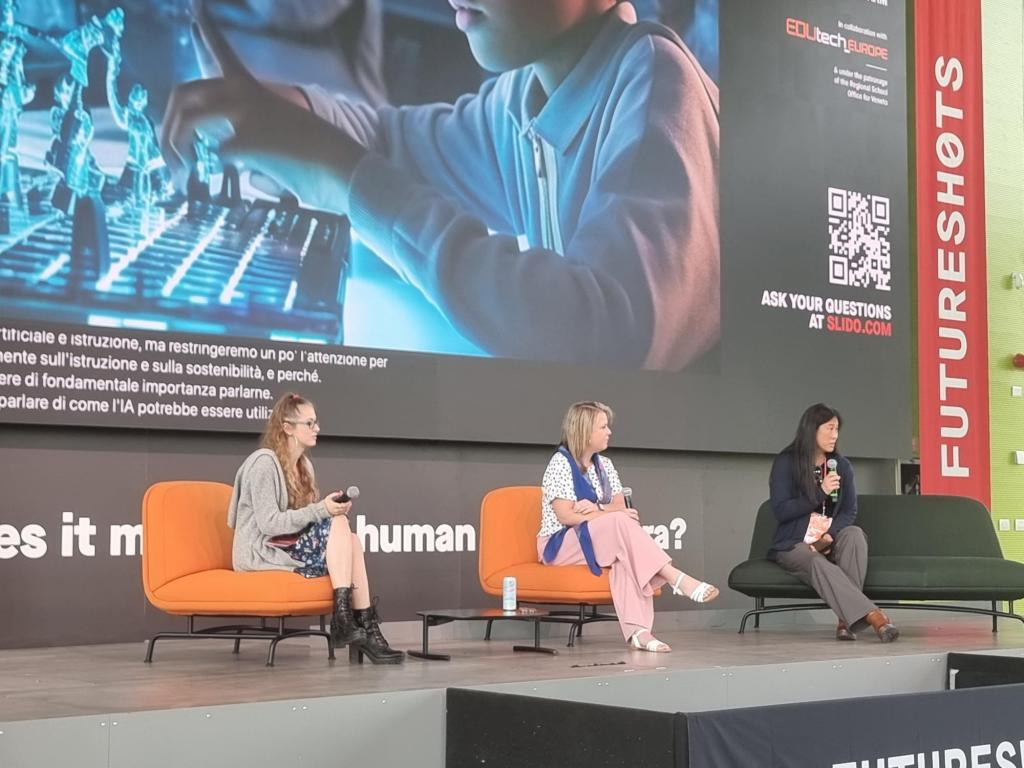
This is the second of two blog posts reflecting on the FutureShots event which I attended and spoke at earlier this month. You can read the first post here which focussed on the first part of the morning, including the keynote from Laura Knight and the panel session which I myself was involved in. This post picks up from there midway through the morning and starts with another panel session where once again some of the early comments resonated with my thinking in relation to AI and education..
Should we consider if AI means we should stop that which we are currently doing? This early comment in the session, to me goes to the fact that technology, including AI, is but a tool and you need to use the right tool at the right time, and therefore there is a lot which we do in schools and colleges currently that we should continue doing. I love a good post-it note in a lesson, posting different thoughts and ideas around the room. Some of what we do may change however equally some things may not change and this is fine. The potential for technology and particularly AI to act as an enabler and a leveller was also mentioned, highlighting how, if used appropriately, technology has the potential to have a profound impact on Bobby, a student I will introduce shortly, and other individual students. Equally during the panel the importance of putting humans at the centre of things, including of AI use, was stated alongside human characteristics such as emotional intelligence

Gemma Gwilliam, a fellow member of The Digital Futures group was up next as part of a panel session alongside Jordan King, Global Opportunity Scholar di Franklin University Switzerland and Jean Wu, Director of Green Office Sustainability Programs di Franklin University. This was the first of Gemma’s two contributions to the event. This session focussed on sustainability and I very much liked the comment on the multi-faceted nature of sustainability. As a director of IT when I consider sustainability I am often thinking about financial sustainability in terms of ongoing replacement and refresh of devices and hardware, or about systemic sustainability in whether a process will be repeatable and scalable. There is also the environment sustainability; does the solution allow us to thrive or merely to survive? Gender equality was also raised as a sustainability issue which to me makes a lot of sense, but I had never previously heard it discussed in this way, in relation to sustainability. It was also very refreshing to hear how AI shouldn’t be seen as a replacement for “flawed” humans, as AI is also flawed. I think this is very interesting as it acknowledges our human flaws and therefore suggests we may need to re-evaluate quite how critical we are of AI when it comes to bias and inaccuracies, etc, where we as humans, on careful analysis, don’t do much better despite the fact we convince ourselves that we do. On this panel, Jordan a young researcher raised the issue of how some see gen-Z as being lacking in resiliency and maybe even being “soft” and in need of constant “trigger” warnings however she then proceeded to point to all the social media and the events in the press, to conflict such as those currently engulfing various parts of the world, which have bombarded her generation through technology more than any other generation in history; Maybe we need to cut gen-Z a bit of slack here.
Now in the afternoon I didn’t take any real notes mainly due to my Surface battery giving up, and me having left by battery pack back at the room which was some distance away. I do remember Gemma’s second contribution of the day, although this might be due to arriving just as she was due to start, sitting in the front row and beginning to eat from a little tub of ice cream; Who needs supportive colleagues when you have me? Now as it was great to hear Gemma hit a particular theme which I believe is so important, in the need to seek collective knowledge. She mentioned a great set of books, including Darren Whites book, where Darren is also a Digital Futures Group member, plus a variety of others. She also mentioned blogs, including mine, plus other online groups and individual sharing ideas, thoughts and resources. For me in a world where technology is moving so fast the old methods of centralised reform and of waiting for CPD are no longer as appropriate as they are too slow. The key and our best hope is to network and to collectively share ideas, thoughts and resources, and this type of networking is the key tenet of the Digital Futures Group. “The smartest person in the room, is the room” as David Weinberger would say, so the bigger the room or more rooms you get involved in the better you, and collectively everyone, will be. Gemma towards the end of the session eloquently brought things back to the students, as that is what education and schools are all about, however her use of “Bobby” and it all being about Bobby, and about us needing to consider Bobby and the effect on Bobby was so very impactful This act of putting a name and making it about a specific, visualisable student rather than the generic and nebulous “students” makes all the difference and really helps nail the need to consider the individual learners in all we do.

It was great to finish the day on top of what we dubbed “Teletubby hill”, being the grassed roof of the building in which the conference was held, looking off towards the setting sun. It was a very busy but also very useful and interesting day. And there was ice cream so what more can you ask for.
How little did I know that attempted murder and Gondola related trauma awaited on day 2!

